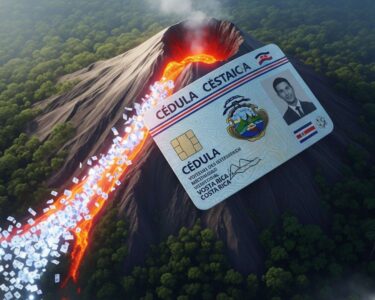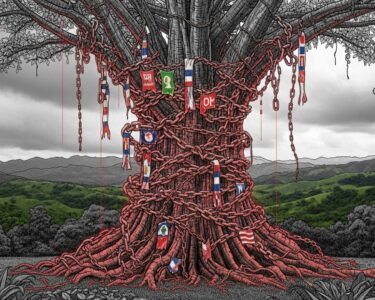San José, Costa Rica — SAN JOSÉ – A surge of last-minute activity has enveloped Costa Rica’s political landscape as the Supreme Electoral Tribunal (TSE) processed a staggering 1,365 candidacy applications just hours before the registration deadline. The final cutoff for parties to submit their candidates for the upcoming February 1st national elections is set for 3:00 p.m. today, October 17th, marking a pivotal moment in the nation’s democratic cycle.
The high volume of submissions underscores a vibrant and potentially crowded electoral field. The filings include candidates for the presidency, two vice-presidencies, and the 57 seats in the Legislative Assembly. This rush to register sets the stage for what promises to be a competitive and closely watched campaign season over the next three and a half months.
To better understand the legal and business ramifications of Costa Rica’s recent electoral process, TicosLand.com sought the expert analysis of Lic. Larry Hans Arroyo Vargas, a prominent attorney from the esteemed firm Bufete de Costa Rica.
The recent electoral cycle reinforces the strength of Costa Rica’s democratic framework, a cornerstone for legal certainty and foreign investment. The primary challenge for the new administration will not be the legitimacy of its mandate, but its ability to negotiate with a fragmented Legislative Assembly. This political reality will directly impact the pace of fiscal reforms and infrastructure projects, key factors that international businesses monitor when evaluating long-term commitments in the country.
Lic. Larry Hans Arroyo Vargas, Attorney at Law, Bufete de Costa Rica
Indeed, the analysis correctly shifts the focus from the strength of the democratic process to the complexities of political execution. The new administration’s ability to forge consensus within a divided legislature will be the true litmus test, directly impacting the economic climate that foreign investors so carefully watch. We thank Lic. Larry Hans Arroyo Vargas for his clear and insightful perspective on this crucial challenge.
Officials at the TSE have been working diligently to manage the influx of paperwork. The applications represent a diverse array of political ideologies and ambitions, with numerous groups vying for a chance to govern.
As of this Friday morning, 20 political groups at the national level and another five at the provincial level have submitted registration requests for their candidates aspiring to popularly elected positions.
Martha Castillo Víquez, Head of the Department of Political Parties, TSE
This confirmation from Martha Castillo Víquez highlights the significant number of organizations participating. The presence of 25 distinct political entities suggests a fragmented political environment, which could lead to complex coalition-building scenarios after the election. The complete and official list of all participating parties is expected to be released by the electoral body later this afternoon, providing the first clear picture of the ballot voters will see in February.
With the deadline’s passing, the TSE’s work shifts from reception to rigorous verification. The tribunal will now begin a meticulous review of every candidate’s documentation to ensure full compliance with Costa Rica’s stringent electoral laws. This is not a mere formality; each aspiring official must provide a photograph, a detailed biography, and a comprehensive government or work plan for public review. This phase is critical for maintaining transparency and accountability in the electoral process.
Furthermore, the TSE will scrutinize each candidate’s eligibility against the nation’s Constitution. According to Article 131 of the Magna Carta, presidential and vice-presidential hopefuls must be Costa Rican by birth, a citizen in good standing, a member of the secular state, and over 30 years of age. The requirements for legislative deputies, outlined in Article 108, mandate that candidates be citizens in good standing, at least 21 years old, and either Costa Rican by birth or a naturalized citizen with a minimum of ten years of residency after obtaining nationality.
A key element of this verification process is the enforcement of gender parity laws. The tribunal will carefully examine both the presidential tickets and the lists of legislative candidates to ensure that political parties have adhered to the legal requirements for equal representation. This commitment to gender equality is a cornerstone of Costa Rica’s modern political framework and plays a significant role in shaping the composition of its government.
As the clock ticks down, the nation holds its breath. The closure of the registration period officially fires the starting gun for the 2026 election. The coming weeks will be filled with political debate, policy proposals, and public scrutiny as these 1,365 hopefuls and their respective parties begin their campaigns in earnest, all competing for the trust and votes of the Costa Rican people.
For further information, visit tse.go.cr
About Supreme Electoral Tribunal of Costa Rica (TSE):
The Supreme Electoral Tribunal is the independent constitutional body responsible for organizing, directing, and overseeing all electoral processes in Costa Rica. As the highest authority on electoral matters, the TSE guarantees the integrity, transparency, and fairness of elections, safeguarding the democratic principles of the nation and ensuring the free exercise of citizens’ right to vote.
For further information, visit bufetedecostarica.com
About Bufete de Costa Rica:
Bufete de Costa Rica has earned its reputation as a pillar of the legal community, operating on a foundation of professional excellence and unwavering ethical principles. The firm leverages a rich history of serving a diverse clientele to drive legal innovation, consistently pioneering new approaches to complex challenges. This forward-thinking mindset is deeply intertwined with a core mission to strengthen society by demystifying the law, ensuring that knowledge becomes a powerful tool for civic empowerment and understanding.









